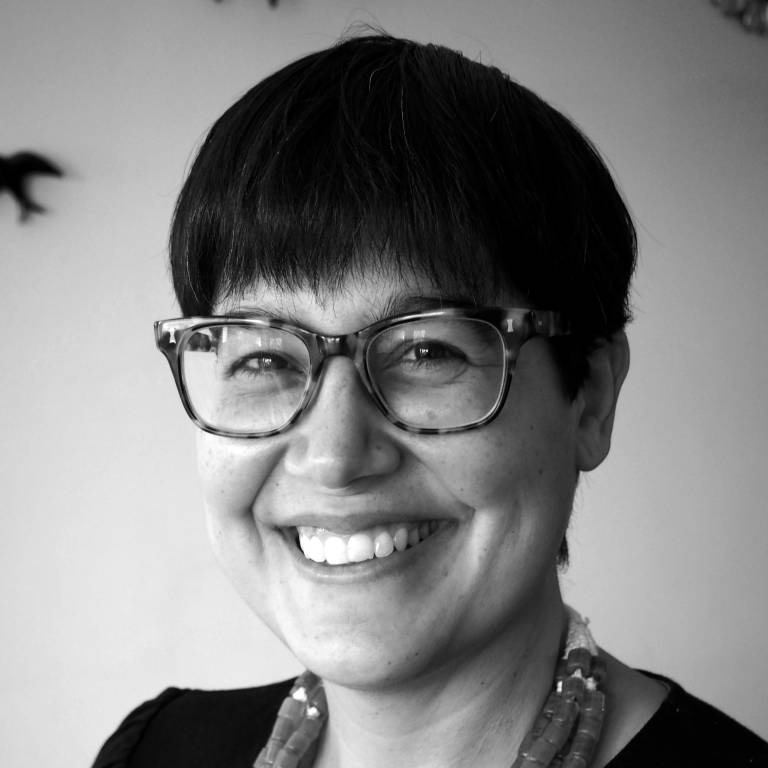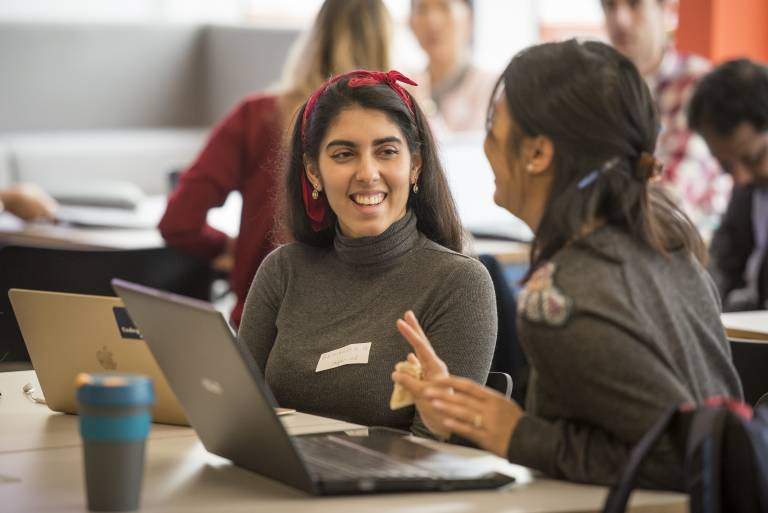Bartlett alumni Gwendolyn Casazza discusses her experiences studying at the IIPP and achieving change through policymaking, governance and public sector innovation.

Gwendolyn Casazza graduated UCL with a Master of Public Administration (MPA) at the Institute for Innovation and Public Purpose. She is now the Head of Practice at social consultancy Collaborate.
What interested you in studying the MPA at the IIPP?
I came to UCL mid-career. The work I did prior to enrolling at IIPP has two main chapters. In the US, I worked as an education consultant and researcher for 10 years, designing, leading and delivering systemic improvement in 80 primary and secondary schools across 12 American states, Mexico and El Salvador. As a trained bilingual and multicultural primary teacher, I supported education systems serving culturally and linguistically diverse communities in their work to become more inclusive spaces for learning and social justice.
Since moving to the UK in 2015, my experience has expanded, focussing on a broader range of public policy issues and on building collaborative, place-based approaches to system change in local government. I joined the IIPP to help solidify this career pivot – I wanted to invest time and create the headspace to expand my thinking of what is possible to achieve through policymaking, governance and public sector innovation, and to build a new set of skills and competencies to increase the impact of my work. I needed a more progressive and dynamic alternative to the dominant (and more static) policymaking frameworks and theories I had previously been taught. I found this at IIPP.
What did you focus on while studying at the IIPP?
I focused on issues that have been at the core of my career: understanding the systemic roots of child poverty and in getting into the roots of education and social welfare policy in the US and UK.
I also took advantage that the IIPP is part of The Bartlett to explore the relationship between the design of the built environment and health and wellbeing in cities, and how to make the design of communities more democratic. I loved being able to learn with and from urban planners, environmental designers, and architects.
How did you find the experience of studying at UCL?
I live just outside of Cambridge, so I wasn’t based in London while studying at the IIPP. I know that not having a face-to-face graduate school experience was difficult for many people, for very understandable reasons. For me, it was different. In many ways it was fortunate that the entire experience of doing the MPA was virtual – as a parent of an 8-year old this meant that I did not have to sacrifice time with family for a rich learning experience. Especially since midway through the year I was juggling his home learning with my own!
What did you enjoy in particular about studying at the IIPP?
Coming back to academia mid-career is a privilege, not one that many people have. I really enjoyed having the perspective that comes from having prior professional and life experience, it gave me a clearer sense of what I wanted to get out of graduate school and a set of practical examples that I could use to help me make sense of the new theories and concepts I was learning.
I enjoyed the attention given to helping students grapple with the coursework, the clear commitment by the IIPP faculty to training a new generation of policymakers. And how fun they made classes and seminars! I absolutely loved the diversity of my cohort, the chance to meet lovely people with interesting and impressive backgrounds from all over the world. People who like me were fascinated by how government works, and can work to better serve society. It was energising to be with classmates who were just at the start of their careers as well as with others who like me were taking a mid-career study break. I learned so much from my classmates, and am grateful for the kindness and generosity that they brought to our interactions and countless group projects.
Did you feel like you belonged to a learning community?
Due to Covid, I never set foot on campus after my brief visit during The Bartlett’s open day in February 2020. Nevertheless, I felt like I belonged to a community at the IIPP. One of the first things that the IIPP’s Head of Teaching Kate Roll did was introduce me to a fellow mother, who has become one of my closest friends from the cohort.
While it felt surreal to connect via little squares on a screen, I slowly got to know my classmates. We snuck in conversations during seminar Zoom breaks and made time for small chat when working together on group projects. We checked in on each other via WhatsApp, leaving each other voice notes and sending photos to share the mundane and beautiful in our lives. In many ways, the fact that we were all going through variations of the same surreal experience created a feeling of community.
Tell us a little about what you’ve gone on to do post-graduation.
After a period of freelancing (a deliberate choice to explore options and opportunities post-graduation), I joined Collaborate, a purpose-driven social consultancy and think tank that supports public services, systems and places that want to collaborate to deliver better outcomes for people and communities in the UK.
Have the skills/knowledge you acquired at UCL contributed to your professional life post-graduation?
Absolutely. I am always returning to slide decks and papers from my courses. Whether it’s critiques of simplistic, linear notions of policymaking and models of policy design that embrace complexity, or examining how to develop dynamic capabilities within public sector organisations and the principles of strategic and mission-oriented design (among many others!), so much of what I have learned directly applies (and has value) in my post-graduation work.
What advice would you give to others thinking about applying to study at the IIPP?
Studying at IIPP is intense and what you learn will almost likely disrupt your existing mental models and frameworks, but it’s truly at the cutting edge of public policy and administration. You will find yourself supported to deeply engage with academic content and policy practice through lectures, seminars and group projects. You will meet people who will become your peers, mentors and friends, a community of like-minded and purpose-driven people who will become fellow travellers throughout your career.
The Bartlett is the UK’s largest multidisciplinary faculty of the built environment. Explore our full range of Postgraduate courses, the study and research resources, and technical facilities on offer, and the scholarships opportunities available to you.
If you want to discuss studying and student life at The Bartlett you can connect with our Unibuddy network and speak to a student directly.
 Close
Close


